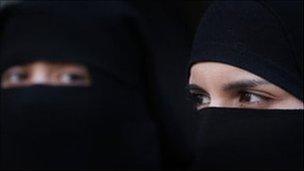Amnesty International finds anti-Muslim bias in Europe

"Muslim women are being denied jobs and girls prevented from attending regular classes just because they wear traditional forms of dress, such as the headscarf. Men can be dismissed for wearing beards associated with Islam," the group's discrimination specialist Marco Perolini said.
"Rather than countering these prejudices, political parties and public officials are all too often pandering to them in their quest for votes."
'Freedom of expression'
The report highlights moves in Belgium, France, the Netherlands and Spain to ban the full-face veils worn by some Muslim women, as well as the ban on minarets enacted in Switzerland in 2009.
It also criticises rules in many countries that forbid students from wearing the headscarf or other religious and traditional dress at school.
"Wearing religious and cultural symbols and dress is part of the right of freedom of expression. It is part of the right to freedom of religion or belief - and these rights must be enjoyed by all faiths equally," Mr Perolini said.
According to the rights group, bans on full-face veils cannot be justified by security concerns, except in certain circumstances such as security checks or high-risk areas.
While applauding the desire to stop women from being coerced into wearing traditional or religious dress, it says this should not be achieved by banning individual women from wearing certain items of clothing.
Amnesty International also accuses Belgium, France and the Netherlands of failing to implement properly laws banning discrimination in employment.
Its report says employers are being allowed to discriminate on the grounds that religious or cultural symbols will conflict with colleagues, customers or the company's image.
Citing statistics showing lower rates of employment among female immigrants from Muslim countries, the report says surveys of Muslim women suggest this is in part to blame on discrimination.
The report's recommendations include the creation of national anti-discrimination bodies and greater efforts to monitor discrimination on religious grounds.
http://www.bbc.com/news/world-europe-17824132
No comments:
Post a Comment